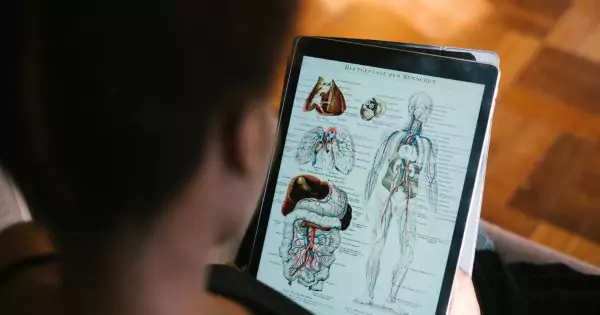
The human body is a marvel of biological engineering, a complex network of systems functioning in remarkable harmony. From the intricate dance of cellular processes to the awe-inspiring abilities of the brain, the body is a testament to nature’s ingenuity. But beyond these wonders lie peculiarities that are lesser-known yet equally fascinating. These wacky facts about the human body will leave you with a renewed appreciation for the quirky vessel we all inhabit.
Unraveling the Tongue’s Mysteries
Did you know that every person’s tongue print is unique? Much like fingerprints, the patterns on your tongue are yours alone. This extraordinary fact makes us ponder the untapped potential of tongue prints in biometric security. Could the future hold tongue scanners at airports or banks? It’s a whimsical thought, yet not entirely beyond the bounds of possibility.
The Stomach’s Hidden Power
The stomach’s acids are so strong they can dissolve metal. If you’ve ever wondered why stomach aches aren’t more catastrophic, it’s because the cells lining the stomach regenerate so rapidly — approximately every four to five days, creating a fresh barrier. This astonishing regenerative ability allows our stomach to host such potent acids without digesting itself.
The Marvel of the Human Eye
Human eyes have a resolution of around 576 megapixels. In comparison, the iPhone 12’s camera comes with a mere 12 megapixels. But unlike a camera, the human eye doesn’t capture everything in high resolution. It’s only the center of our vision that is highly detailed, while the periphery is lower in resolution. This is why when you’re looking for that tiny star in the sky, it often disappears when you try to look directly at it.
The Wonders of Bone Resilience
Your bones are ounce for ounce stronger than steel. A bar of steel of comparable size might weigh more, but your bones can handle an immense amount of pressure. This incredible strength is especially vital in protecting our internal organs and supporting our bodies against the relentless force of gravity.
The Enigma of Brain Capacity
The brain’s storage capacity is considered virtually unlimited. It doesn’t get filled up like a hard drive; instead, it continually adapts and rewires itself. If your brain were a digital video recorder, it’s estimated that it could hold an average of three million hours of TV shows. You would have to leave the TV running continuously for more than 300 years to use up all that storage.
The Riddle of Sneezing

Sneezes regularly exceed 100 mph. When a sneeze comes on, it’s your body’s way of getting rid of something irritating the nose. A sneeze is a powerful, involuntary expulsion of air, which can send thousands of germs flying at a speed that rivals the fastest sports cars.
The Phenomenon of Heartbeats
Your heart beats around 100,000 times a day. Over a lifetime, that adds up to about 2.5 billion beats. The heart’s persistent pumping ensures that blood reaches every part of the body, carrying vital oxygen and nutrients. This relentless biological drumbeat is the unsung hero of our everyday existence.
The Miracle of the Microbiome
You have more bacterial cells in and on your body than human cells. The human microbiome is a bustling metropolis of microbes, each with a role to play. These bacteria are not merely squatters; they’re essential for processes like digestion and immunity. They’re so integral to our being that some scientists refer to them as an additional organ.
The Puzzle of Fingerprints
Fingerprints develop in the womb and are visible by the 17th week of pregnancy. These swirling patterns are not only crucial in establishing identity but also in improving grip. Interestingly, the reason behind the uniqueness of these patterns is still not entirely understood, though they are known to be influenced by genetic and environmental factors.
The Body’s Nightly Growth Spurt
You are taller in the morning than in the evening. This might sound like a page out of “Alice in Wonderland,” but it’s a physiological truth. During the day, the soft cartilage between your bones compresses under the force of gravity, slightly reducing your height. After a night’s rest, you’re back to your maximum height, only to shrink again as the day goes on.
In the grand tapestry of life, these facts are but a few threads that highlight the body’s eccentricities. Each quirk is a narrative in miniature, a story of evolution, adaptation, and survival. As we delve deeper into the mysteries of the human body, we discover that it is not just a vessel for our journey through life, but also a source of endless fascination and surprise. This wondrous biological machine continues to baffle, delight, and educate us, revealing that even the most ordinary of us carries within a universe of extraordinary facts.
Like it? See more 15 wacky human body facts below:
15 Wacky Human Body Facts
Our bodies are a complex and intriguing network of systems, and even beyond the impressive functionality, there are some downright wacky facts that many of us are unaware of. From glow-in-the-dark bodies to superhuman senses, the human body is a treasure trove of weird and wonderful trivia. Here are 15 fascinating facts that reveal the curious wonders of the human body:
1. The Saliva Generator

Your mouth is a saliva factory working overtime, producing about one liter of saliva each day! That’s enough to fill two average-sized water bottles.
2. The Sleepy Brain’s Activity Surge
It’s a little-known fact that your brain can be more active during sleep than when you’re awake. This bustling brain activity is especially true during REM (Rapid Eye Movement) sleep when you dream.
3. The Global Circulation of Blood Vessels
If you were to lay out all an adult’s blood vessels end to end, they would circle the Earth’s equator four times. That’s over 100,000 miles of vessels!
4. Muscles and Roman Rodents
The word “muscle” is derived from the Latin term “musculus,” meaning “little mouse.” This is because Ancient Romans thought flexed bicep muscles looked like little rodents moving under the skin.
5. Human Bioluminescence
Human bodies emit a small amount of light that’s generally invisible to the naked eye. This light is a byproduct of biochemical reactions within our cells.
6. The Belly Button Ecosystem
Your navel may be home to up to 67 different species of bacteria, making it a bustling hub of microbial life.
7. The Yearly Skin Shed
Annually, a person loses about 4 kilograms (almost 9 pounds) of skin cells. With over 7 billion people on Earth, that’s a lot of dead skin floating around!
8. Delayed Tears in Babies
Newborns do cry, but they don’t produce real tears until they are at least one month old. Until then, it’s just crying sounds with no watery eyes.
9. Nerve Velocity
Information travels along nerves at about 400 kilometers per hour (249 mph), which explains our quick reflexes.
10. The Beating Heart’s Lifelong Marathon
Throughout an average lifespan, the human heart will beat more than three billion times, unremittingly pumping blood throughout the body.
11. Asymmetrical Lungs
Your left lung is about 10 percent smaller than your right lung to make room for your heart.
12. The Strength of Human vs. Shark Teeth

Human teeth and shark teeth are equally strong. While sharks can replace their teeth, humans can only do so once, exchanging baby teeth for adult ones.
13. The Nose Knows a Trillion Scents
Scientists believe the human nose can distinguish a trillion different scents. This sense is far more sophisticated than we often give it credit for.
14. The Blushing Phenomenon
Humans are the only animals known to blush, a trait linked to our complex social interactions and emotional responses.
15. Blood’s Weighty Contribution
Blood makes up about eight percent of your body weight. For a 150-pound person, that’s about 12 pounds of blood coursing through their veins.
These facts only scratch the surface of the mysterious and often surprising nature of our bodies. The deeper we delve into the study of human anatomy, the more wonders we are bound to discover. Whether it’s the extraordinary capacity of our brains or the unique composition of our blood vessels, there’s no denying that the human body is a source of endless fascination.

























































































































